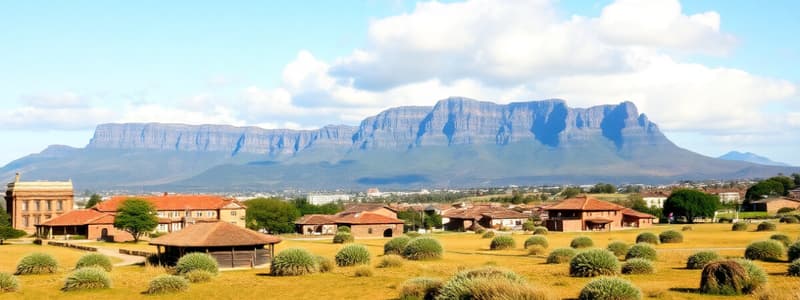Podcast
Questions and Answers
Why were slaves brought to the Cape?
Why were slaves brought to the Cape?
To provide labor for the colonial economy.
How were slaves brought to the Cape?
How were slaves brought to the Cape?
They were transported via ships from various regions.
Where did the slaves at the Cape come from?
Where did the slaves at the Cape come from?
They came from various locations including Africa, Madagascar, and Asia.
What restrictions were placed on slaves at the Cape? (Select all that apply)
What restrictions were placed on slaves at the Cape? (Select all that apply)
Slaves at the Cape were allowed to form groups on public holidays.
Slaves at the Cape were allowed to form groups on public holidays.
Flogging was a punishment for slaves who insulted a freeman.
Flogging was a punishment for slaves who insulted a freeman.
Slaves were permitted to own or carry guns.
Slaves were permitted to own or carry guns.
For how long was slavery present at the Cape?
For how long was slavery present at the Cape?
What were the free burghers in the Cape primarily composed of?
What were the free burghers in the Cape primarily composed of?
Flashcards are hidden until you start studying
Study Notes
Slavery at the Cape
- Slavery was introduced at the Cape, significantly impacting social and economic structures from the 17th to the 18th century.
- Slaves were brought to the Cape primarily to meet labor demands in agriculture and other sectors.
- The transportation of slaves to the Cape involved harsh conditions and inhumane treatment during the journey.
Origins of Slaves
- Many slaves at the Cape originated from regions in the east, including Madagascar, India, and various parts of Africa and the Indian Ocean islands.
Life as a Slave at the Cape
- Slaves were required to be indoors by 10 PM and had to carry a lantern if caught outside.
- Riding horses or wagons in the streets was prohibited for slaves.
- Engaging in singing, whistling, or making sounds at night was forbidden.
- Social interactions were heavily restricted; slaves could not meet in bars, purchase alcohol, or form groups on public holidays.
- Gathering near church entrances during services was not allowed.
- Severe punishments awaited slaves who insulted freemen or made false accusations, including flogging and chaining.
- Striking a slaveholder was punishable by death, demonstrating the harsh enforcement of control over slaves.
- Ownership or carrying of firearms was forbidden, limiting self-defense options for slaves.
Slave Resistance
- Instances of resistance against slavery were recorded, highlighting the persistent struggle for freedom by slaves.
- Notable events include the 1808 Slave Rebellion originating from Bird's Song at the Cape of Good Hope, which was an expression of high treason against colonial rule.
Legacy of Slavery at the Cape
- Slavery persisted at the Cape for 180 years, leaving a lasting impact on the society and demographics.
- The presence of free burghers, including Dutch settlers and French Huguenots, contributed to the complex social dynamics at the Cape.
- Expansion of frontiers occurred as trekboers moved inland, marking a new phase in the colonial history of the region.
Studying That Suits You
Use AI to generate personalized quizzes and flashcards to suit your learning preferences.




